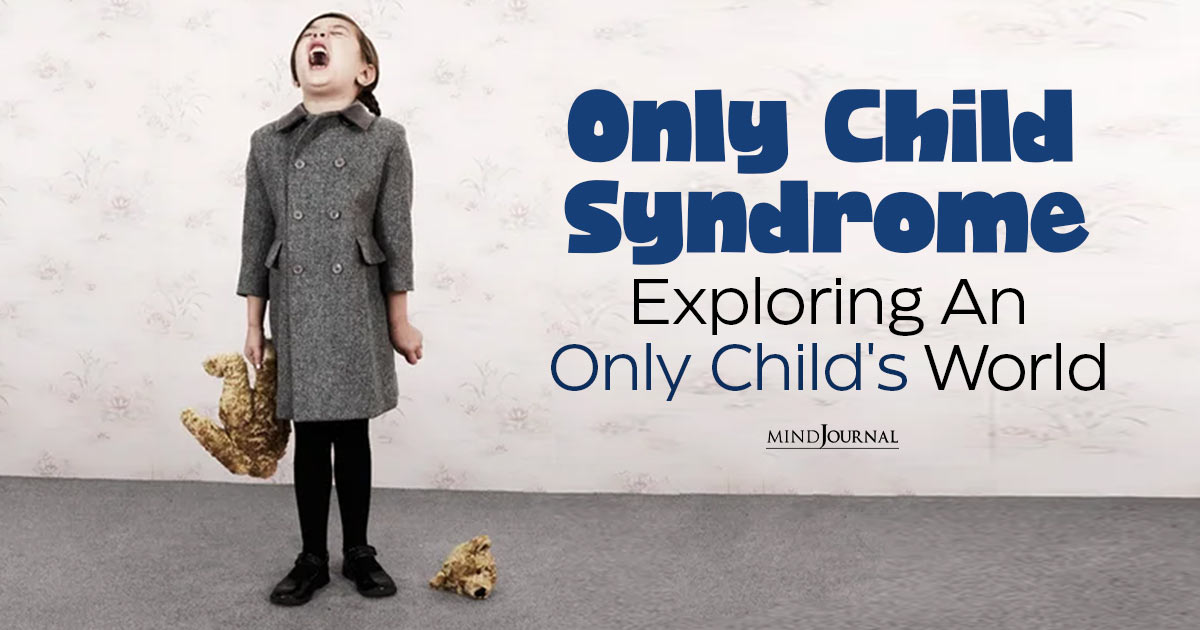What is the only child syndrome and how does an only child feel growing up without siblings? This article is going to talk about how it feels being an only child, and what it entails. So, let’s get started, shall we?
There is a stereotype that only children, children without siblings, fail to develop the ordinary social bonds and attachments that children with siblings do. The reality is more nuanced.
It does not follow that children with siblings are automatically more adaptable, more able to share, more able to understand group dynamics, but it is the case that only children didn’t grow up having to deal with sibling rivalry, or with having to share their parents.
They haven’t had the experience of being overlooked by a parent who may have preferred a sibling to them. Equally, they haven’t had another sibling to help them manage a difficult and demanding parent.
All of these experiences are individual to each of us and shape our early experiences and attachment bonds.
Related: Why Mothers With One Child Are Happiest
When loneliness is onliness
An only child knows what is sometimes referred to as ‘onliness,’ that is, the loneliness of being the only child in the family.
As a category, the ideas associated with only child syndrome are based more upon myth than fact. Only child syndrome might be a label but it isn’t an actual psychological condition.
It is the case that only children do not grow up with a sibling to help organise and shape the world for them, but that doesn’t mean that the child will be self-centered, selfish, or narcissistic as the myths often claim.
In Western culture, the only child is often thought of as something of a misfit, but this says more about our prejudices than anything else. If an only child is seen to be causing problems, struggling at school, etc, this can quickly and unfairly be blamed upon the child being an only child rather than anything else.
The caricature is that only children are spoiled and have grown up being used to getting whatever they want from their parents, and that this in turn fuels selfishness. These qualities are then identified in the adult the only child goes on to become.
It is true that only children might have been able to get more attention from their parents, than children with siblings, but this isn’t necessarily the case. Some only children, just like they may feel they missed out on having siblings, are more neglected by parents.

Are you the only child of an only child?
The child of an only child may find themselves in competition with their parent who, having grown up only thinking more about themselves and their needs, may struggle to know how to accommodate the needs of their child.
Related: 10 Different Types Of Siblings And Why They Are Important For A Happy Life
Only Child Syndrome
Only children may have grown up with a greater sense of loneliness than children with siblings.
Only children have had to bear their parent’s emotional states without it being diluted by siblings. Equally, they may have felt themselves to have had more attention from their parents than they wanted.
For some only children, childhood had a claustrophobic quality, the sense that they were always being monitored, that childhood lacked the freedom that they saw their friends be offered.
Some only children grow up feeling themselves extra special, that they were so exposed to their parent’s hopes and ambitions that they could never find the freedom to be themselves. These children may feel more pressure to deliver on their parents’ high expectations.
The imagination of the only child
For a lot of only children who spent a lot of time in their childhoods alone, they may as a consequence have developed more of a relationship with an imaginary internal world. They may have spent much more time daydreaming than children with siblings.
- So the only child may be more prone to introversion than children with siblings.
- Faced with challenges in groups they may be more prone to withdraw.
That’s not to say that children who grew up with siblings are all extroverts, but growing up an only child naturally puts the developmental accent more on independence. Only children are perhaps more at home dealing with things by themselves.
The question for a lot of adult only children is how to adapt and fit into the world when they have been so used to being autonomous and to being alone.
For example, how to handle criticism? Does growing up an only child make it harder to navigate the complexities of a larger social group? Growing up with siblings encourages a wider range of social skills.
All of this may mean that the only child has to work harder to accommodate and feel themselves at home in groups. They may struggle to feel comfortable if they go on to have more than one child themselves and may have to pay attention to how they come to terms and adapt and adjust.
Related: 12 Reasons Why The Middle Child Is The Best Child
In relationships, we may need to find ways to curb our independence so that we can create good attachments in the families we aspire to create.
Written By Toby Ingham Originally Appeared On Toby Ingham










Leave a Reply